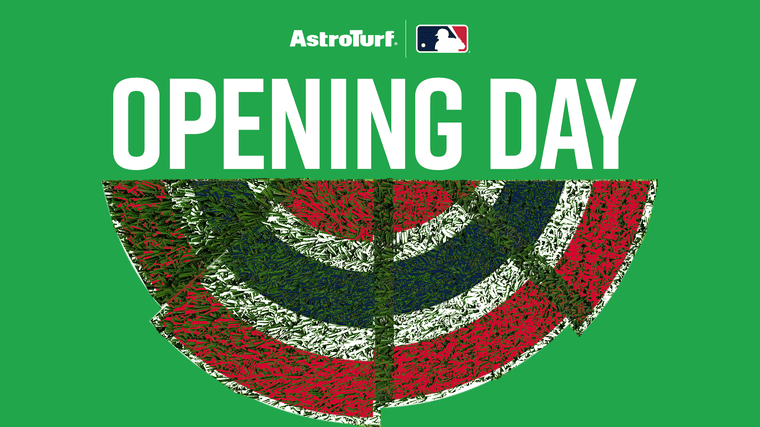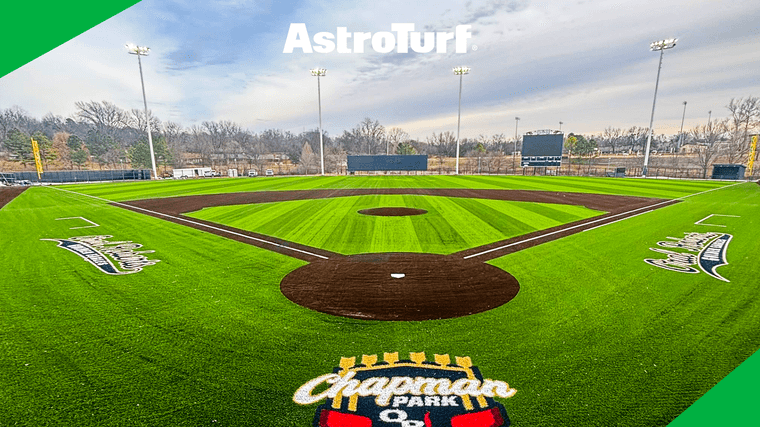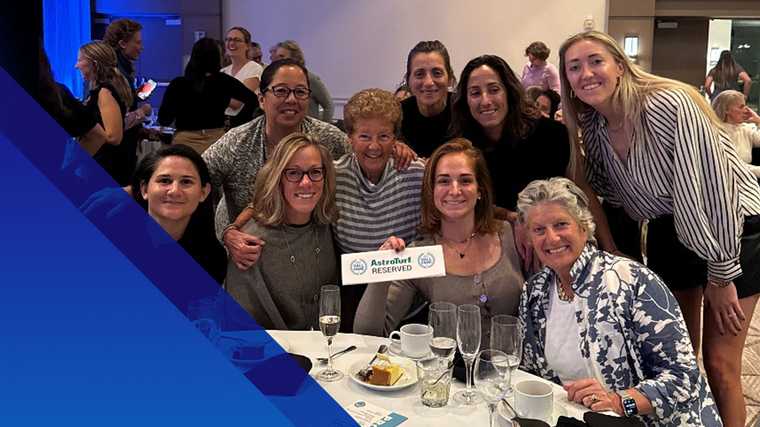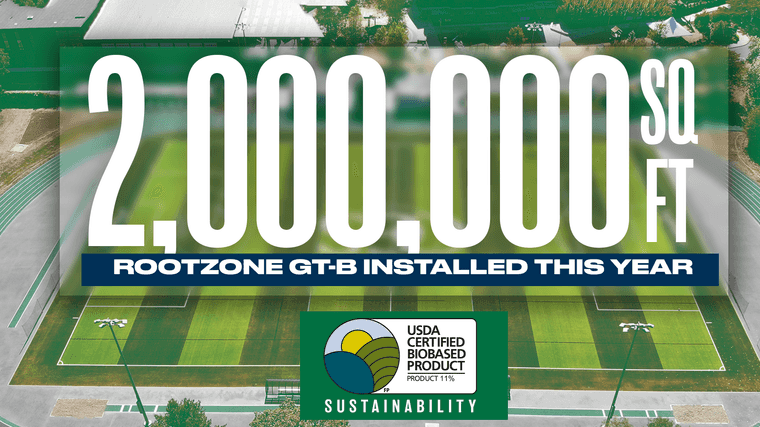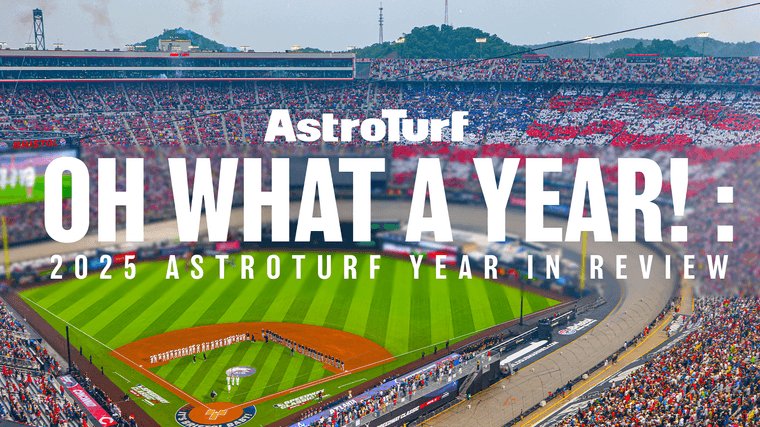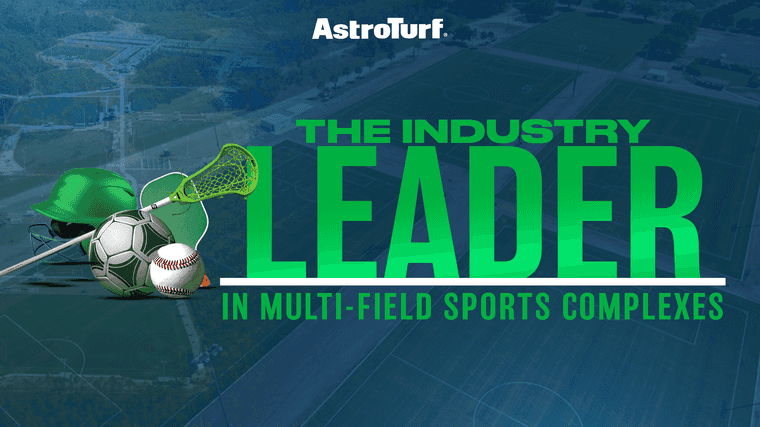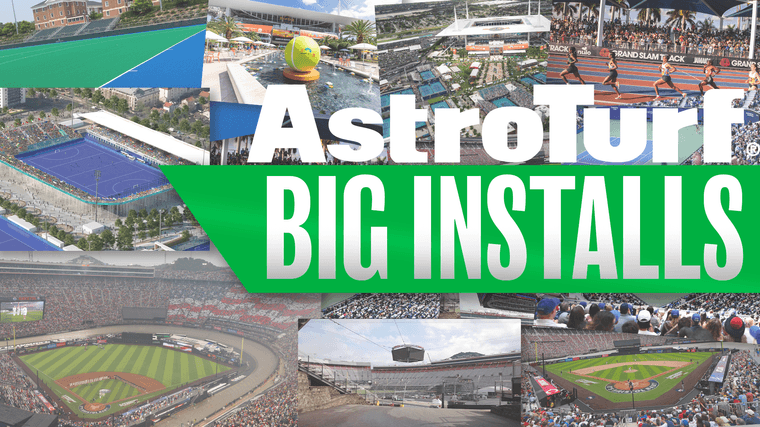The First PFAS-Free Synthetic Turf and Misinformation About Turf
Sport Group is committed to enhancing the quality, sustainability, and safety of all its products. We continually develop new and improved technologies, ingredients, and manufacturing processes. Since 2019 we have been working intensively on finding alternatives, and have steadily removed the fluor chemistry from our global production plants – STR in USA, APT in Australia and Polytex in Germany.
AstroTurf is the first synthetic turf company to address and develop turf that is PFAS-free. Our products are not made with any PFAS. We also take measures to help ensure these substances are not added to our products through material, design, production, facility, and supplier controls.
We achieved this by removing a fluorinated polymer from the turf manufacturing process and applying a new generation of polymer process aids that are free from fluorinated chemistry. This proactive innovation went beyond the regulations at the time and ensures that we are now leading the industry in PFAS elimination.
What Our Development Team Notes
At AstroTurf, we do a series of rigorous product safety tests. As part of our approach, AstroTurf products are tested for per- and polyfluoroalkyl substances (PFAS). We use third-party, accredited internationally recognized labs for our product testing for individual PFAS compounds as well as total organic fluorine. This includes the organic fluorine tests.
AstroTurf is not made with PFAS.
PFAS, are absolutely not part of our product design. We also take measures to help ensure these substances are not added to our products through material, design, production, facility, and supplier controls. We care deeply about the materials used in our products, putting performance and safety at the core of our design, development, and manufacturing.
Supplier Agreements
Raw material agreements are specified to have no intentionally added PFAS materials.
Manufacturing Partner Requirements
We require all manufacturing partners to strictly adhere to our manufacturing standards. As the industry leader, we share manufacturing and testing technologies with partners to push the industry towards PFAS compliance.
Finished Product Evaluations
Finished products are tested through an accredited, globally recognized third-party lab to ensure they are not manufactured with PFAS.
Regulation compliance in the United States
Sport Group is globally compliant with all current legal regulations. This includes for example REACH in the EU.
At present, California has the most stringent regulations, with California Health and Safety Code 108945. In 2023 products manufactured at STR in Dalton, GA were tested by independent laboratories and comply with this Californian standard, which defines a threshold of PFAS using a total organic fluorine screening method specifically for children’s products. Meeting this standard determines the threshold of what is considered as ‘PFAS-free’. We will continue to independently test our products each year, as part of our internal auditing processes.
Sport Group places the highest priority on the health and safety of its customers, its employees, and the environment. We are transforming our products with green technology, and have an independent ESG (Environmental, Social and Governance) rating that places the company in the top 7% of over 15,000 companies globally.
Sport Group turf is sold globally directly via our own companies, AstroTurf, Polytan and APT, or via our independent sales network.
California’s discussions around banning artificial turf, especially due to concerns about PFAS, are based on misconceptions and could lead to unintended negative outcomes.
Essential Points for Lawmakers and the Public
Artificial turf is not a major source of PFAS exposure.
In states facing severe drought and water constraints, AstroTurf plays a vital role in conserving water. Each AstroTurf field saves between 500,000 and one million gallons of water annually. With over 20,000 artificial turf fields across the nation, this results in a remarkable annual conservation of approximately 10-20 billion gallons of water.
Additionally, natural grass fields can become unplayable during droughts, leading to interruptions in sports activities. A ban on artificial turf could therefore disrupt sports programs and negatively impact community well-being. Sports participation is linked to higher college attendance rates, lower crime, and reduced substance abuse among young people.
Clarifying Myths: PFAS, Heat Retention, and Sustainability
If we’re genuinely concerned about PFAS, we should be cheering on big box stores and fast-food chains as they eliminate from food packaging and other household goods. PFAS are widespread, but AstroTurf’s products have been designed without PFAS. Our current turf is manufactured without any added PFAS, and has been since 2020. AstroTurf was the first synthetic turf manufacturer to eliminate PFAS from their products by requiring its exclusion from suppliers, as well as the first to test for it.
This proactive approach ensured that AstroTurf products have been manufactured without PFAS, long before the current wave of attention and regulation hit the market. PFAS concentration in AstroTurf products that are installed already are significantly lower compared to many common consumer goods. Typically, these PFAS are introduced when the product is contaminated after being installed.
Other major industries and retailers, such as fast-food chains and grocery stores, are beginning to address the PFAS issue (Cooke, 2024). For example, companies like McDonald’s and Starbucks have committed to removing PFAS from food packaging by 2025, while major grocery chains like Trader Joe’s and Whole Foods have made similar commitments. This movement underscores the critical need for change, but many are still in the process of phasing out these chemicals, often relying on extended timelines.
| Company Name | Commitment Date | PFAS-Free Timeline | U.S. Stores | U.S. Sales |
|---|---|---|---|---|
| Restaurant Brands Intl. | March 2022 | 2025 | 28,000 (global) | $35 billion (global) |
| McDonald’s | January 2021 | 2025 | 39,198 (global) | $100.2 billion (global) |
| Taco Bell | January 2020 | 2025 | 7,427 (global) | $11.7 billion (global) |
| Starbucks | March 2022 | 2022 (U.S.), 2023 (global) | 34,000 (global) | $29.1 billion (global) |
| Ahold Delhaize | September 2019 | No specific timeline | 1,973 | $44.7 billion |
| Amazon | 2020 | No specific timeline | 36 | N/A |
| TJX | 2020 | No specific timeline | 3 | N/A |
| Patagonia | 2022 | 2024 | 70 (global) | $800 million (global) |
| Target | 2020 | 2025 | 1,868 | $77.1 billion |
AstroTurf is proud to have been a leader in eliminating PFAS from products and processes. We’re also thrilled to see other major companies importantly making similar commitments. For example, Restaurant Brands International, which owns Burger King, Popeyes, and Tim Hortons, committed in March 2022 to banning PFAS in food packaging by 2025 (Toxic-Free Future). With 28,000 global locations and $35 billion in global sales, RBI is a major player taking steps to address this issue.
Similarly, McDonald’s, the largest fast-food chain with over 39,000 locations and $100.2 billion in sales, committed in January 2021 to remove PFAS from all packaging by 2025. Taco Bell made a similar pledge in January 2020, targeting a 2025 deadline to phase out PFAS in its 7,427 global stores.
In the retail space, Target and Patagonia are leading the charge. Target committed in 2020 to eliminating PFAS from its owned-brand products by 2025, while Patagonia, with 70 global locations and $800 million in sales, will go PFAS-free by 2024.
AstroTurf and Sport Group put enormous effort into increasing the sustainability of our synthetic turf. Sustainalytics, a leading global provider of ESG research, ratings, and data evaluated the activities of all Sport Group manufacturing and installation companies. We’re proud to have received a low or negligible risk rating in all categories (Sustainalytics 2023). The categories included Environmental and Sustainable Impact of Products and Services, Emissions, Effluents and Waste, Resource Use, Occupational Health & Safety and Corporate Governance. Together this constituted an overall rating of 11.2 low.
AstroTurf, aligned with Sport Group, is dedicated to advancing sustainable, reliable sports surfaces globally. Facing the challenge of climate change, our ESG rating epitomizes our commitment to environmental care, social responsibility, and strong governance. This commitment to ESG, validated by independent ratings, underscores our dedication to all stakeholders. We strive to reduce our environmental impact and foster societal wellbeing, ensuring our operations contribute positively to sustainable development goals.
All synthetic turf companies and researchers are working issues steaming from and relating to heat. All synthetic turf companies and industry leaders want to cool down fields for the comfort of players. So long as synthetic turf uses plastic fibers, there will be some heat that builds up on the surface. It’s important to note that turf heat is generally not a player safety issue. Rather, it is a player comfort issue. Research has shown that while the fibers are hot, creating higher temperatures at ground and knee level, surface heat dissipates as it rises to chest and head levels, the areas critical for player safety.
The University of Tennessee at Knoxville (Williams 2022) has indicated that on a summer day in Knoxville, Tennessee, temperatures differed by less than 3° F difference between natural grass and AstroTurf artificial turf systems. There was a four-inch gap between the surface and thermometer placed at ankle height. While the actual surface was much warmer, this means that it is placebo rather than science or fact when it is speculated that it is much hotter to play on an artificial turf surface.
Water Conservation Through AstroTurf Field Systems
Based on research conducted by The Ohio State University, a natural grass sports field typically requires between 1 and 2 inches of water per week during the growing season, which usually spans from May through November. Depending on the specific conditions such as soil type, climate, and field usage, this translates to approximately 600,000 to 1.5 million gallons of water annually (Sherratt & Munoz 2017). The irrigation schedule would involve around 26 to 52 irrigation events each year, with each event delivering enough water to ensure the turf remains healthy and safe for athletic activities.
To put the water usage into perspective, consider what you could fill with 50,000 and 600,000 gallons of water. Fifty thousand gallons of water could fill about 5,000 standard bathtubs, assuming each holds approximately 10 gallons. This amount of water could also fill a small backyard swimming pool multiple times over, 12 fuel tanker trucks, or 10 large fire trucks.
On the larger scale, 600,000 gallons could fill a 50-meter Olympic-sized swimming pool to a depth of about 4 feet. Alternatively, it could fill around 60,000 bathtubs, around 120 large fire trucks, 12,000 standard 50-gallon hot water heaters, or an Olympic-sized swimming pool to a depth of about 4 feet.
To put this in perspective, during each irrigation event, between 22,000 and 57,000 gallons of water might be applied, depending on whether 1 or 2 inches of water are used. The precise amount of water required can vary significantly based on local climate conditions, including temperature, wind, and humidity, which influence the rate of evapotranspiration (ET). This careful water management is crucial for maintaining the playability of the field, particularly for high-traffic areas like football or soccer fields.
Community Impact of a Turf Ban
The implications of banning artificial turf go beyond just the costs of replacement and maintenance for schools and municipalities. AstroTurf provides critical benefits—both environmental and social—that natural grass cannot offer (Project Play). Water restrictions could render remaining natural grass fields unsafe and uneven. Natural grass cannot support as many play hours as turf, potentially reducing access to sports for both athletes and children.
Physical activity is crucial for health and wellness, including physical, mental, and emotional well-being. AstroTurf provides a solution that conserves water, reduces chemical runoff, and maintains safe, playable surfaces.
With advancements in turf technology addressing issues like microplastics, recyclability, and PFAS, banning synthetic turf would ultimately harm our communities.









